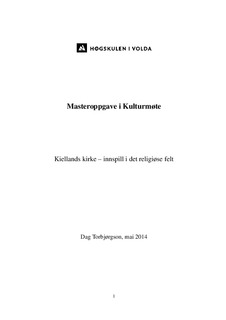| dc.contributor.author | Torbjørgson, Dag | |
| dc.coverage.spatial | Noreg | nn_NO |
| dc.coverage.temporal | 1880-1889 | |
| dc.date.accessioned | 2014-06-18T07:30:30Z | |
| dc.date.available | 2014-06-18T07:30:30Z | |
| dc.date.issued | 2014 | |
| dc.identifier.uri | http://hdl.handle.net/11250/196501 | |
| dc.description.abstract | Summary
The subject of this essay is the cultural encounter between a radical literary culture and a conservative religious culture. Timeline for the essay is primarily the breakthrough of modernism in Norway and Scandinavia (1870-1890), though earlier events relevant to the subject is brought in. At the time of the modernism's breakthrough, new ways of thinking regarding science had emerged, and in 1884 Norway got a new form of state practice through the implementation of parliamentarism. In this essay the literary culture is presented through the Norwegian writer Alexander L. Kielland. In the field of Norwegian literature, this time in the literary history is often viewed as a golden age, and Norway had several great writers in the genre of realism. Alexander L. Kielland wrote a number of publications, in which he was rather critical concerning the clergy and the state church. In my efforts to analyze how the criticism of the church was received, I have applied the “theory of fields” by the french sociologist Bourdieu. According to this theory, there are well-defined social fields in society, which by some lengths are autonomic. The members of each field strive to acquire the advantages unique with that field, or the capital associated with that field. Based partly on the access to capital, the members of the field have different social positions. In this essay I have demonstrated a religious field in Norway in the nineteenth century, where the members, among other things, fought for religious capital. Further in the essay I examine in which way the criticism of the church was received by the religious field, and by which form it reached the field. This will make the criticism of the church visible and furthermore identify the social position of Alexander L. Kielland in the religious field. With his criticism, the writer had a wish to influence the religious field. By analyzing how the criticism was received in the religious field, I attempt to show to which degree he was successful in this task. In the eighteen eighties the question of whether Kielland should receive state funded salaries for his authorship was debated and tried in the parliament. An analysis of these processes will further contribute to an understanding of his position in the religious field. All in all the essay attempts to show Kiellands position in the religious field, and at the same time describe the cultural encounter between the radical author and the religious field. | nb_NO |
| dc.language.iso | nob | nb_NO |
| dc.publisher | Høgskulen i Volda | nb_NO |
| dc.subject | VDP::Humaniora: 000::Historie: 070::Kulturhistorie: 075 | nb_NO |
| dc.subject | VDP::Humaniora: 000::Litteraturvitenskapelige fag: 040::Nordisk litteratur: 042 | nb_NO |
| dc.subject | VDP::Humaniora: 000::Historie: 070::Politisk historie: 071 | nb_NO |
| dc.subject.ddc | 306.66158 | |
| dc.subject.ddc | 839.8236 | |
| dc.subject.ddc | 948.04 | |
| dc.title | Kiellands kirke – innspill i det religiøse felt | nb_NO |
| dc.type | Master thesis | nb_NO |
| dc.source.pagenumber | 145 | nb_NO |
| dc.subject.keyword | kiellandstriden | nn_NO |
| dc.subject.keyword | kulturradikalisme | no_NO |
| dc.subject.keyword | kristen tradisjonalisme | nn_NO |
| dc.subject.keyword | kristenkonservativisme | nn_NO |
| dc.subject.keyword | modernismegjennombrotet | nn_NO |
| dc.subject.keyword | norsk litteratur | nn_NO |
| dc.subject.keyword | samtidsromanar | nn_NO |
| dc.subject.keyword | kulturstrid | nn_NO |
| dc.subject.keyword | diktargasje | nn_NO |
| dc.subject.keyword | kulturpolitisk hegemonikamp | nn_NO |
| dc.subject.keyword | religiøs kulturkapital | nn_NO |
| dc.subject.keyword | religionssosiologisk felt | nn_NO |
| dc.subject.keyword | St Hans Fest / Kielland, Alexander L. | nb_NO |
| dc.subject.keyword | Sne / Kielland, Alexander L. | nb_NO |
